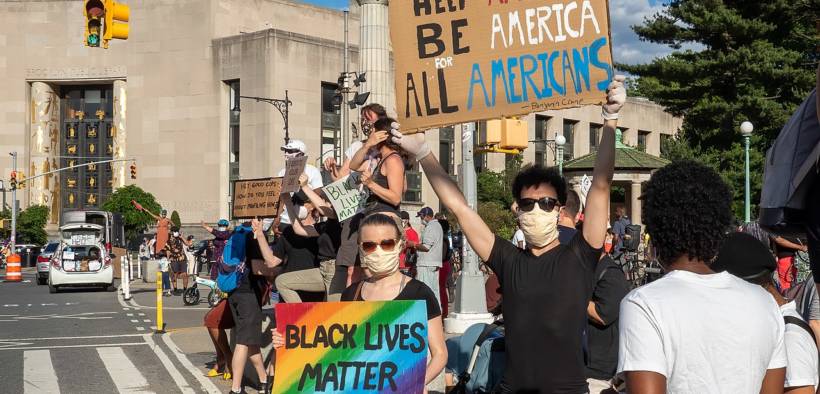Democrats in Congress Are Taking on a Police Culture Run Amok

With mass protests over the killing of George Floyd by Minneapolis police officer Derek Chauvin morphing into demands to grapple with racism and to confront a police culture where brutality is all too common, and with the anguished words of Floyd’s brother, Philonise Floyd, echoing through the Capitol, congressional Democrats on June 8 rolled out their first effort to address the national uprising, the Justice in Policing Act of 2020.
The act is one of the most comprehensive attempts to reform policing in years. According to a House Judiciary Committee press release, the Justice in Policing Act of 2020:
- “Prohibits federal, state, and local law enforcement from racial, religious and discriminatory profiling, and mandates training on racial, religious, and discriminatory profiling for all law enforcement.
- “Bans chokeholds, carotid holds and no-knock warrants at the federal level and limits the transfer of military-grade equipment to state and local law enforcement.
- “Mandates the use of dashboard cameras and body cameras for federal offices and requires state and local law enforcement to use existing federal funds to ensure the use of police body cameras.
- “Establishes a National Police Misconduct Registry to prevent problematic officers who are fired or leave on agency from moving to another jurisdiction without any accountability.
- “Amends federal criminal statute from ‘willfulness’ to a ‘recklessness’ standard to successfully identify and prosecute police misconduct.
- “Reforms qualified immunity so that individuals are not barred from recovering damages when police violate their constitutional rights.
- “Establishes public safety innovation grants for community-based organizations to create local commissions and task forces to help communities to re-imagine and develop concrete, just and equitable public safety approaches.
- “Creates law enforcement development and training programs to develop best practices and requires the creation of law enforcement accreditation standard recommendations based on President Obama’s Task force on 21st Century policing.
- “Requires state and local law enforcement agencies to report use of force data, disaggregated by race, sex, disability, religion, age.
- “Improves the use of pattern and practice investigations at the federal level by granting the Department of Justice Civil Rights Division subpoena power and creates a grant program for state attorneys general to develop authority to conduct independent investigations into problematic police departments.
- “Establishes a Department of Justice task force to coordinate the investigation, prosecution and enforcement efforts of federal, state and local governments in cases related to law enforcement misconduct.”
“We have heard the terrifying words ‘I can’t breathe’ from George Floyd, Eric Garner, and the millions of Americans in the streets calling out for change,” said House Judiciary Committee Chair Jerrold Nadler (D-NY). “For every incident of excessive force that makes headlines, the ugly truth is that there are countless others that we never hear about. This is a systemic problem that requires a comprehensive solution.”
“What we are witnessing is the birth of a new movement in our country with thousands coming together in every state marching to demand a change that ends police brutality, holds police officers accountable, and calls for transparency,” said Congressional Black Caucus Chair Karen Bass (D-CA). Passage of the act would “establish a bold transformative vision of policing in America,” she added. “Never again should the world be subjected to witnessing what we saw on the streets in Minnesota with George Floyd.”
But that “bold transformative vision” doesn’t directly address one of the main drivers of fraught encounters between law enforcement and the citizenry, especially in minority communities. Police enforcing drug prohibition have arrested more than a million people a year every year since the late 1980s, with the number peaking at about 1.89 million in 2006 before declining to less than 1.5 million in 2015 and then rebounding slightly to 1.65 million in 2018. Around four-fifths of all drug arrests in 2007 were for drug possession, and more than 42 percent of all drug arrests nationwide that year were for marijuana possession.
And despite marijuana legalization at the state level beginning in 2012 with Colorado and Washington and now extending to 11 states and the District of Columbia, marijuana remains the main driver of drug-related arrests, accounting for about 40 percent of all drug arrests in 2018, the last year for which full data is available. Only 8 percent of those pot arrests were for cultivation or distribution; more than nine out of 10 were for simple possession.
The bill does call for federally banning no-knock raids—perhaps a better term would be home invasion raids—like the one Louisville police used when they burst through the door of the home of Breonna Taylor, a 26-year-old Black EMT, near midnight on March 13, on the incorrect suspicion that drugs were hidden there, and fatally shot her. Her death helped fuel the rage in Louisville and across the country. Drug law enforcement is the primary reason for federal no-knock raids.
A summary of the bill provided by the House Judiciary Committee notes that Black people “are 2.5 times more likely to be arrested for possessing drugs, despite using drugs at the same rate as” white people, and that Black people are “3.6 times more likely to be arrested for selling drugs,” even though white people “are more likely to sell drugs.” The bill summary presents this in the limited context of the bill’s call to end racial and religious profiling. Drug decriminalization, on the other hand, would radically reduce opportunities for discriminatory policing by radically reducing the number of people of all races subject to being arrested for their choice of substances.
In a statement on the bill, the Drug Policy Alliance (DPA) said it was “grateful” that the congressional leadership had filed the legislation for much-needed police reform, but that it does not go nearly far enough.
“[T]his bill fails to fully address issues like police militarization and the use of quick-knock warrants, policing practices that are disproportionately used against people of color in drug investigations,” said Maritza Perez, director of DPA’s Office of National Affairs. “While the bill places restrictions on programs that facilitate the transfer of military equipment to local police departments, it does not outright put an end to such programs. And while this bill prohibits no-knock warrants for drug cases, it does not outlaw quick-knock warrants which can be just as deadly. Moreover, the bill continues to fund police departments and the war on drugs, rather than shift resources to education, housing, harm reduction services, and other infrastructure that strengthens communities and increases public safety.”
The bill needs to be toughened, DPA said, offering to “work with Congress to improve and strengthen” it.
The American Civil Liberties Union (ACLU) was also ambivalent, with a press release lauding the bill’s provisions banning chokeholds, limiting use of force, and prohibiting racial and religious profiling, but also arguing that it doesn’t go far enough.
“The bill… takes significant steps to protect people and ensure accountability against police violence. But the legislation also provides hundreds of millions more to law enforcement, and for the ACLU, that’s a nonstarter,” said the ACLU’s senior legislative counsel Kanya Bennett.
“While many of the reforms in this bill are laudable and vital, more must be done to change the role of police in our society fundamentally,” Bennett continued. “There can be no more Band-Aid or temporary fixes when it comes to policing, which is why we are calling for divestment from law enforcement agencies and reinvestment into the Black and Brown communities that have been harmed by over policing and mass incarceration. The role of police has to be smaller, more circumscribed, and less funded with taxpayer dollars.”
Still, the bill has the support of a broad coalition of civil rights organizations, including the NAACP, the National Urban League, the Leadership Conference on Civil and Human Rights, and the National African American Clergy Network (NAACN), among others.
“The National African American Clergy Network supports the Justice in Policing Bill. It affirms sacred scripture that everyone is created in the image of God and deserves to be protected by police sworn to value and safeguard all lives. Failure by police to uphold this sacred trust with black Americans[’] lives, requires systemic changes in policing nationwide,” said Dr. Barbara Williams-Skinner, Dr. Otis Moss Jr., and Dr. T. DeWitt Smith Jr., co-convenors of the NAACN.
The Justice in Policing Act will move swiftly toward passage in the House but faces much bumpier prospects in the Republican-controlled Senate. While President Trump has been advocating military crackdowns on protesters, circulating conspiracy theories about antifa terrorists and offering himself up as “your president of law and order,” GOP senators led by Tim Scott (R-SC)—the party’s only Black senator—have crafted their own version of a police reform bill, the JUSTICE Act. While it acknowledges the need for police reform, which is a significant step for Republicans, it is an even more watered-down version of the Democrats’ bill.
If the Drug Policy Alliance thought the Democrats’ bill didn’t go far enough, the group was positively scathing about the Republican effort.
“To call this bill a ‘police reform’ is disingenuous,” said DPA’s Perez. “What we have here are ‘reforms’ that are simply more studies, reports, and commissions that look good on paper, but do not actually hold law enforcement accountable for police misconduct. It waters down provisions contained in the Democratic Justice in Policing Act such as merely requiring that law enforcement report on the use of no-knock warrants, the kind that led to the death of Breonna Taylor in her bed—rather than outright banning them. And it does not outright prohibit chokeholds, like the ones that killed George Floyd or Eric Garner, as the Democratic bill does at the federal level. Instead, it just incentivizes states and localities to implement a ban through federal funding.”
The protests and public outcry putting pressure on Congress to get something done so far show no sign of letting up. Whether the legislative body can actually come to grips with this crisis of confidence in government and policing remains to be seen. But it’s already had a very salutary taste of what could be in store if it doesn’t.
This article was produced by Drug Reporter, a project of the Independent Media Institute. The Drug Policy Alliance is a funder of Drug Reporter.















